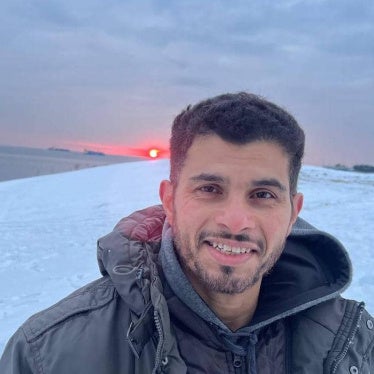The European Union and its member states should press vigorously for the unconditional release of 10 Syrian pro-democracy activists, Human Rights Watch said today. The men were arrested in August and September 2001, and were sentenced earlier this year to prison terms ranging from two to 10 years. They include two independent members of parliament, two lawyers, a prominent economist, and two medical doctors.
"The Syrian government has cracked down hard on advocates of political reform, human rights, and civil society," said Lotte Leicht, Brussels director of Human Rights Watch. "The EU must send a clear message that such actions are unacceptable and will have consequences."
Human Rights Watch announced today that it was launching an international campaign to press the EU to act on behalf of the 10 prisoners, and made public a letter it sent last week to European Commissioner Chris Patten, CFSP High Representative Javier Solana and the EU foreign ministers.
The EU and Syria are negotiating an Association Agreement, a trade pact which states that relations between the parties "shall be based on respect of democratic principles and fundamental human rights as set out in the Universal Declaration on Human Rights, which guides their internal and international policy and constitutes an essential element of [the agreements]."
"The EU has leverage with Syria and should be using it now. It should suspend further negotiations until the 10 men are released unconditionally," Leicht said.
The next Association Agreement negotiating session will take place in Brussels in October 2002.
Human Rights Watch said in its letter to EU officials that the criminal prosecution and imprisonment of Syrian citizens for the mere exercise of their rights to freedom of expression and association made "a mockery of these asserted principles."
September 2002
Your Excellency,
We are writing about the harsh crackdown on the nascent pro-democracy and human rights movement in Syria. To date, ten advocates of Syria´s democratic reform and the revival of civil society have been sentenced to prison terms ranging from two to ten years. They include two outspoken members of parliament and a prominent economist. We urge the European Union and its member states to raise their cases at the highest level with Syrian government officials and campaign actively for their unconditional release.
The ongoing Association Agreement negotiations between Syria and the EU present one of several forums for protesting the harsh criminal sentences handed down against these peaceful activists. Association agreements stipulate that relations between the parties "shall be based on respect of democratic principles and fundamental human rights as set out in the Universal Declaration on Human Rights, which guides their internal and international policy and constitutes an essential element of [the agreements]." The criminal prosecution and imprisonment of citizens for the mere exercise of the rights to freedom of expression and association make a mockery of these asserted principles.
All of the men faced vaguely worded political charges such as "attempting to change the constitution by illegal means" and "spreading false information."
Eight of the ten activists were tried and sentenced in the state security court, a judicial body whose procedures do not meet international fair-trial standards and whose judgments cannot be appealed, in violation of international human rights law. They are:
Aref Dalila, prominent economist and university professor, sentenced to ten years in July 2002. He is a founding member of the Committees for the Revival of Civil Society.
Habib Issa, a lawyer, sentenced to five years in August 2002. Mr. Issa is a founding member of the Human Rights Association of Syria and served as a spokesperson for the Gamal al-Atasi Forum for Democratic Dialogue, one of the many independent civil society groups that emerged following the death of former president Hafez al-Asad in 2000.
Dr. Walid al-Bunni, a physician, sentenced to five years in July 2002. He helped launch the Human Rights Association of Syria last year.
Fawaz Tello, an engineer, sentenced to five years in August 2002, who was active in the civil society movement.
Dr. Kamal Labwani, a physician, sentenced to three years in August 2002, and an active member in the independent Committees for the Defense of Human Rights (CDF).
Habib Saleh, a businessman, sentenced to three years in June 2002, also active in the country´s civil forums.
Riad al-Turk, a 72-year-old lawyer and head of the unauthorized Communist Party-Political Bureau, sentenced to two and half years in June 2002. Mr. Turk was imprisoned without charge and held incommunicado from 1981 to 1998.
Hassan Saadun, a teacher, sentenced to two years in August 2002. He too was active in the civil society movement.
The two parliamentarians, both of whom were elected as independent candidates, were tried in Damascus criminal court. Mamoun al-Homsi was sentenced to five years imprisonment in March 2002, and Riad al-Seif to five years in April 2002. Their convictions were upheld on appeal.
The imprisonment of these ten men is a gross violation of the internationally protected rights to freedom of expression and association. In addition, it only serves to reverse the momentum that had been building inside Syria to press for democratic reform, the lifting of martial law, accountability for past human rights abuses, and loosening the political grip of the ruling Ba´th Party. The intimidating effect of imposing harsh prison terms on peaceful political activists cannot be underestimated, particularly given the climate of fierce repression that Syrian citizens lived through for decades under the rule of the late president Hafez al-Asad.
The European Union, the European Commission, and EU member states should take steps to ensure that the cases of these reformers and proponents of democracy are raised at the highest levels with Syrian government officials. We urge the EU to send a clear message to Damascus that further negotiations of the Association Agreement will not proceed until the ten men are released unconditionally, with full restoration of their civil and political rights, including the ability to leave and enter the country freely.








